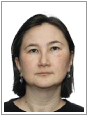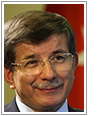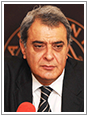TPQ in 2014
In Turkey’s increasingly restrictive political and intellectual environment, TPQ is one of the few independent platforms that continues to stimulate constructive and critical debates. With your support, we can continue to push the boundaries of discussion, encourage the exchange of multiple perspectives, and strive to uphold freedom of expression – crucial components of democracy that have been repeatedly threatened in Turkey and its neighborhood. The TPQ team is staunchly committed to providing our readers with diverse and informed analyses across a multitude of topical issues.
As 2015 gets off to its start, we would like to present you with an overview of some of the debates furthered by TPQ over the last year.

|

At a time when the relationship of the West with Russia is at its most difficult since the Cold War, TPQ furthered the debate on how the West manages its relations with Moscow, and how Turkey plays into the power balances of the wider Black Sea region. Our contributors emphasized that the nature of competition is not only geopolitical but also normative. As the rift between Russia and the West widens, our authors also questioned whether Ankara’s balancing act is becoming increasingly unsustainable.

|
|
 “I believe all nations are capable of democracy; of course, you have to want it to succeed in it – that is why democratization was so quick and smooth for parts of Eastern Europe.”
“I believe all nations are capable of democracy; of course, you have to want it to succeed in it – that is why democratization was so quick and smooth for parts of Eastern Europe.”
|
 “Russia’s attempts to alter internationally recognized borders of sovereign states are challenging one of [NATO’s] key principles: that each country has the right to freely choose its own path.”
“Russia’s attempts to alter internationally recognized borders of sovereign states are challenging one of [NATO’s] key principles: that each country has the right to freely choose its own path.”
|

|
|
 “Throughout the last 65 years of NATO history, the focus of the Alliance has evolved and adapted to its geopolitical environment and this is no different today.”
“Throughout the last 65 years of NATO history, the focus of the Alliance has evolved and adapted to its geopolitical environment and this is no different today.”
|
 “The weakening of the West means that Russia and Turkey have little and less to gain from aligning themselves with the declining West, and thus have to pursue more self-sufficient paths.”
“The weakening of the West means that Russia and Turkey have little and less to gain from aligning themselves with the declining West, and thus have to pursue more self-sufficient paths.”
|

|
|
 “Taking a firm moral position on dictators and exhibiting strong reactions to any violation of human rights and basic freedoms are still the most effective instruments for defending values and preventing an erosion of the EU’s foundations.”
“Taking a firm moral position on dictators and exhibiting strong reactions to any violation of human rights and basic freedoms are still the most effective instruments for defending values and preventing an erosion of the EU’s foundations.”
|
 “The Crimean Tatar diaspora demands that Turkey join the bandwagon of states that apply economic sanctions to Russia. However, Turkey continues to engage with an increasingly isolated Russia, and uses this leverage to demand improvements on the situation of the Crimean Tatars.”
“The Crimean Tatar diaspora demands that Turkey join the bandwagon of states that apply economic sanctions to Russia. However, Turkey continues to engage with an increasingly isolated Russia, and uses this leverage to demand improvements on the situation of the Crimean Tatars.”
|

|

We have followed Armenian-Turkish relations closely over the years, always providing a forum for diverse perspectives and angles. In our Spring 2014 issue, we published an article by then Turkish Foreign Minister Ahmet Davutoğlu, entitled “Turkish–Armenian Relations: Is a ‘Just Memory’ Possible?” This sparked a dialogue over the concept of “just memory” in relation to Turkish-Armenian history, including a response paper from historian Gerard Libaridian. As the 24 April 2015 centennial draws near, we expect to share more compelling arguments on this issue with our audiences.

|
|
 “The Ottoman order did not suppress Armenian identity; on the contrary it guaranteed its existence by including it in the melting pot and integrating it within official structures.”
“The Ottoman order did not suppress Armenian identity; on the contrary it guaranteed its existence by including it in the melting pot and integrating it within official structures.”
|
 “By consolidating the ‘millet system,’ the Ottoman Empire raised religious identity above Armenian political identity. Armenian people with a long history of statehood were reduced to a religious community.”
“By consolidating the ‘millet system,’ the Ottoman Empire raised religious identity above Armenian political identity. Armenian people with a long history of statehood were reduced to a religious community.”
|

|

TPQ has consistently covered energy debates pertaining to the neighborhood – both in the journal and, since 2010, with annual roundtable discussions. In light of Europe’s need to diversify sources of natural gas imports and Turkey’s claim to become an energy hub, we have focused particularly on the geostrategic and political dynamics involved in the prospective Southern Gas Corridor. With the first foundations for TANAP being laid in September 2014, our debate this year focused on whether the limited amount of natural gas TANAP and TAP are initially set to transport would really contribute to European energy security, whether Russia might act as a spoiler, and what the prospects of additional resources from other countries joining the corridor in the near future are.

|

|
|
 “Northern Iraq also has very good opportunities – the Turkish government and the KRG are working very well together on solving political issues, so one may well see gas resources coming from this region on stream soon.”
“Northern Iraq also has very good opportunities – the Turkish government and the KRG are working very well together on solving political issues, so one may well see gas resources coming from this region on stream soon.”
|
 “Turkey’s natural gas consumption has grown dramatically over the last decade – from 15 billion cubic meters (bcm) in 2000 to 46 bcm in 2012 – making it the most dynamic natural gas market in the OECD region.”
“Turkey’s natural gas consumption has grown dramatically over the last decade – from 15 billion cubic meters (bcm) in 2000 to 46 bcm in 2012 – making it the most dynamic natural gas market in the OECD region.”
|

|

As the rest of the world has been recovering from financial contraction, Turkey has been experiencing a decade-long economic boom. While some analysts attribute Turkey’s success to the ruling AKP’s economic policies, others raise doubts about the sustainability of Turkey’s economic performance, including Erdoğan’s ambitious goal of joining the world’s top 10 economies by 2023. Our contributors suggest that Turkey cannot continue its current growth pace without increasing confidence in the rule of law and undertaking structural reforms in the education system, labor, and gender equality.

|
|
 “If Turkey can educate its young population effectively it can achieve sustainable economic growth based on high productivity and innovation. This structural reform is the most important challenge Turkey faces.”
“If Turkey can educate its young population effectively it can achieve sustainable economic growth based on high productivity and innovation. This structural reform is the most important challenge Turkey faces.”
|
 “The lower the confidence is in the institution of law, rule of law, and independence of the judiciary in Turkey, the more risky it is likely to be considered by investors.”
“The lower the confidence is in the institution of law, rule of law, and independence of the judiciary in Turkey, the more risky it is likely to be considered by investors.”
|

|
|
 “Turkey cannot think of the world economy without its own involvement in it, but is comfortable with climate policies being formed without its full participation.”
“Turkey cannot think of the world economy without its own involvement in it, but is comfortable with climate policies being formed without its full participation.”
|
 “Turkey should initiate a major lobbying effort with the US administration, key leaders in Congress, and EU decision-makers to write the necessary docking provisions into TTIP.”
“Turkey should initiate a major lobbying effort with the US administration, key leaders in Congress, and EU decision-makers to write the necessary docking provisions into TTIP.”
|

|

Further distancing Turkey from its previously stated goal of “zero problems with neighbors,” new regional security risks have coupled with longstanding problems in its neighborhood, making Turkey’s intraregional relations more volatile than ever. Many of our contributors this year analyzed sources of the contention among Turkey and its neighbors, examined Ankara’s initiatives to resolve conflicts, and offered domestic and foreign policy recommendations to render Turkey a constructive player with regard to long-term regional stability and security.

|
|
 “Turkish foreign policy in the region has been on a downward slide since the AKP government gradually dispensed with secular principles.”
“Turkish foreign policy in the region has been on a downward slide since the AKP government gradually dispensed with secular principles.”
|
 “There is no doubt that the Nagorno-Karabakh conflict resolution and the opening of the Turkish-Armenian border would make Russia’s position in the broader South Caucasus untenable.”
“There is no doubt that the Nagorno-Karabakh conflict resolution and the opening of the Turkish-Armenian border would make Russia’s position in the broader South Caucasus untenable.”
|

|
|
 “Not knowing what the ‘other’ is thinking about us hampers our ability to hear each other and perhaps realize how stereotypes and resultant ill feelings about the “other” are constructed on both sides.”
“Not knowing what the ‘other’ is thinking about us hampers our ability to hear each other and perhaps realize how stereotypes and resultant ill feelings about the “other” are constructed on both sides.”
|
 “Ankara does not want Abkhazia to be economically isolated, Russian businesses to dominate Abkhazia, and the traditional links between the Abkhaz diaspora in Turkey and their motherland to be severed.”
“Ankara does not want Abkhazia to be economically isolated, Russian businesses to dominate Abkhazia, and the traditional links between the Abkhaz diaspora in Turkey and their motherland to be severed.”
|

|
What to expect from TPQ in 2015?
In 2015, TPQ will focus on the following debates to continue to provide cutting-edge and independent analysis on Turkey and its neighborhood:
• The status of Turkey’s democracy
• Shifting alliances and security trends in the MENA region
• The role of the 1915 events in Turkish-Armenian relations and the ‘just memory’ debate
• Turkey’s economic trajectory
• Regional energy geopolitics
• Regional security risks and NATO’s policy options
Also stay tuned for the completely revamped TPQ website, which will be online in January! Besides being more user-friendly and allowing better accessibility via smart phones and tablets, the new website will also feature a blog and debates sections to provide informed and up-to-date perspectives to our global audience.

|
Engage in the debates on Turkey and its neighborhood with TPQ in 2015!




|
We would like to thank the corporations that
advertised with and provided sponsorship to our journal in 2014:
|
Thanks to our Partners
|
 
|

